新概念英语第一册73-74课
新概念英语第一册第73-74课-The way to King
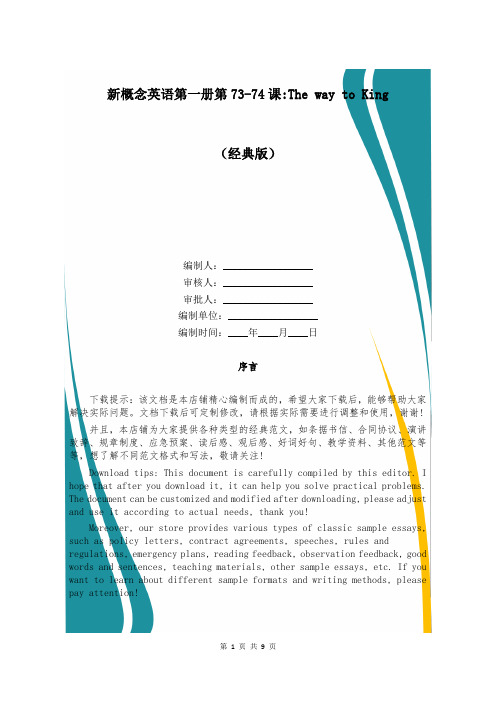
新概念英语第一册第73-74课:The way to King(经典版)编制人:__________________审核人:__________________审批人:__________________编制单位:__________________编制时间:____年____月____日序言下载提示:该文档是本店铺精心编制而成的,希望大家下载后,能够帮助大家解决实际问题。
文档下载后可定制修改,请根据实际需要进行调整和使用,谢谢!并且,本店铺为大家提供各种类型的经典范文,如条据书信、合同协议、演讲致辞、规章制度、应急预案、读后感、观后感、好词好句、教学资料、其他范文等等,想了解不同范文格式和写法,敬请关注!Download tips: This document is carefully compiled by this editor. I hope that after you download it, it can help you solve practical problems. The document can be customized and modified after downloading, please adjust and use it according to actual needs, thank you!Moreover, our store provides various types of classic sample essays, such as policy letters, contract agreements, speeches, rules and regulations, emergency plans, reading feedback, observation feedback, good words and sentences, teaching materials, other sample essays, etc. If you want to learn about different sample formats and writing methods, please pay attention!新概念英语第一册第73-74课:The way to King新概念英语第一册第73-74课:The way to King StreetLesson 73 The way to King Street到国王街的走法Listen to the tape then answer this question。
新概念第一册Lesson 73-74课

.God helps those who help themselves. 天助自助者。
How to ask the way:
• Can you tell me the way to ……? • How can I get to ……? • Where is ……?
10. ________ (be) your mother a sales assistant last year? No. she __________.
Read and change 1. Emma made the tea half a hour ago.
When did Emma make the tea? 2. The man under the tree lost his way to his hotel.
Come upstairs and see it. • 这里的and指的是“目的”
• 3.ask sb. sth. 问某人某事。 • eg:He asked the teacher a question. • ask sb for sth向某人要某物 • ask for it=ask for trouble自找麻烦
It is pleasant today. 给人好感的人
a pleasant person
She smiled a pleasant smile.
=She smiled pleasantly.
★understand (understood) ① v. 理解;懂 我不明白你的意思
v. 懂,明白
I don’t understand what you mean.
Who lost the way to the hotel? 3. Susan didn’t answer the call last night because she doesn’t like the awful guy.
新概念英语第一册第73-74课:The way to King Street
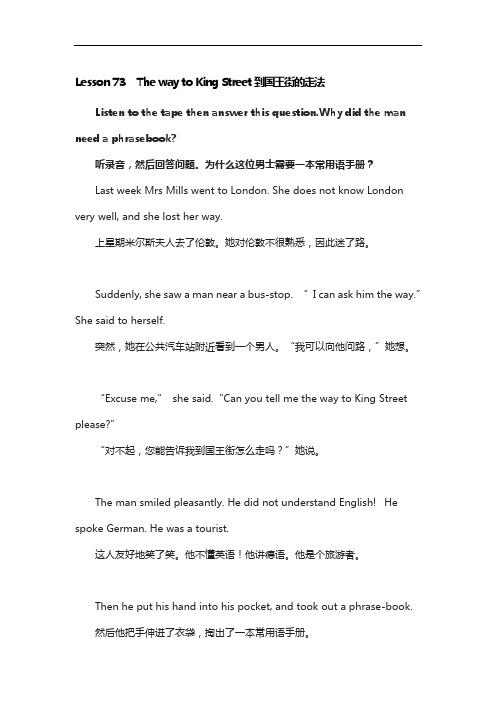
Lesson 73 The way to King Street到国王街的走法Listen to the tape then answer this question.Why did the man need a phrasebook?听录音,然后回答问题。
为什么这位男士需要一本常用语手册?Last week Mrs Mills went to London. She does not know London very well, and she lost her way.上星期米尔斯夫人去了伦敦。
她对伦敦不很熟悉,因此迷了路。
Suddenly, she saw a man near a bus-stop. “I can ask him the way.”She said to herself.突然,她在公共汽车站附近看到一个男人。
“我可以向他问路,”她想。
“Excuse me,”she said.“Can you tell me the way to King Street please?”“对不起,您能告诉我到国王街怎么走吗?”她说。
The man smiled pleasantly. He did not understand English! He spoke German. He was a tourist.这人友好地笑了笑。
他不懂英语!他讲德语。
他是个旅游者。
Then he put his hand into his pocket, and took out a phrase-book.然后他把手伸进了衣袋,掏出了一本常用语手册。
He opened the book and found a phrase. He read the phrase slowly. 他翻开书找到了一条短语。
他缓慢地读着短语。
“I am sorry,”he said. “I do not speak English.””很抱歉,“他说,”我不会讲英语。
新概念英语第一册73课练习题

新概念英语第⼀册73课练习题新概念英语第⼀册73-74课测验⼀、写出下列词语(20分)打招呼输掉、丢失迷路突然伦敦汽车站原谅微笑旅游旅⾏者打招呼短语、成语使⼈激动努⼒地、艰苦地获胜路途丹麦⼝袋懂、明⽩回家路上⼆、翻译(40分)1、她昨天晚上到达伦敦。
2、她上星期在伦敦迷路了。
3、他拿起⼀瓶⽜奶饥渴地饮了起来。
4、他对你说了些什么?5、你前天在街上遇到了她吗?6、他今天下午努⼒学习了吗?7、他⼉⼦叫什么名字?8、我明天要去伦敦(tomorrow)。
三、选择填空(20分)1. He shaved this morning and cut himself badly.A. hurryB. hurrilyC. hurriedD. hurriedly2. I her in the street yesterday and she me warmly.A. meet,greetsB. met,greetedC. meet,greetedD. met,greets3. He a cake and quickly.A. take,eatB. takes,eatsC. took,ateD. took,eats4. He swam very this afternoon.A. goodB. wellC.D. hard5. Did he a bottle of milk this morning?A. drankB. drinkC. drinksD. drinking四、写出下列动词的过去式(20分)see read go lose takedo say find speak eatmeet are drink swim is。
新概念第一册第73、74课
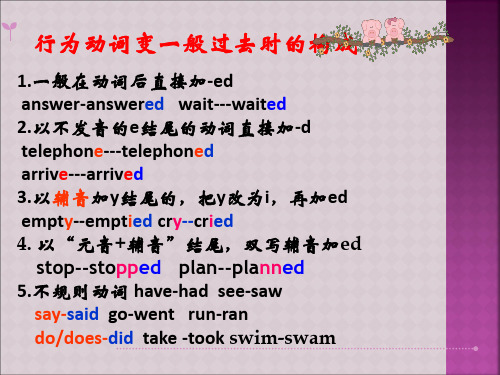
• take-took • take out 拿出,取出 • takeout 快餐店的外卖
find-found read-read(过去式和原形一样) say-said
The way to King Street
Last week Mrs. Mills went to London. She does not know London very well, and she lost her way. Suddenly, she saw a man near a bus stop. 'I can ask him the way.' she said to herself. 'Excuse me,' she said. 'Can you tell me the way to King Street, please?' The man smiled pleasantly. He did not understand English! He spoke German. He was a tourist. Then he put his hand into pocket, and took out a phrasebook. He opened the book and found a phrase. He read the phrase slowly. 'I am sorry,' he said. 'I do not speak English.'
farm.
Lesson 73 The way to King Street
• week
[wi:k]
• London ['lʌndən]
新概念英语第一册73-74课课文详解、翻译及语法
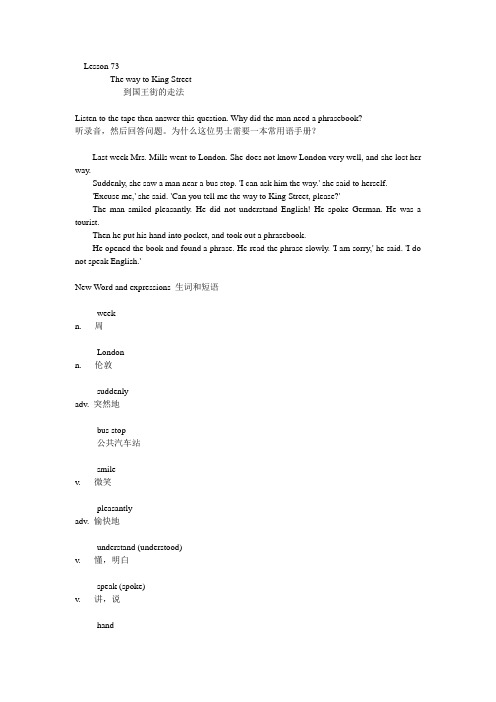
Lesson 73The way to King Street到国王街的走法Listen to the tape then answer this question. Why did the man need a phrasebook?听录音,然后回答问题。
为什么这位男士需要一本常用语手册?Last week Mrs. Mills went to London. She does not know London very well, and she lost her way.Suddenly, she saw a man near a bus stop. 'I can ask him the way.' she said to herself.'Excuse me,' she said. 'Can you tell me the way to King Street, please?'The man smiled pleasantly. He did not understand English! He spoke German. He was a tourist.Then he put his hand into pocket, and took out a phrasebook.He opened the book and found a phrase. He read the phrase slowly. 'I am sorry,' he said. 'I do not speak English.'New Word and expressions 生词和短语weekn. 周Londonn. 伦敦suddenlyadv. 突然地bus stop公共汽车站smilev. 微笑pleasantlyadv. 愉快地understand (understood)v. 懂,明白speak (spoke)v. 讲,说handn. 手pocketn. 衣袋phrasebookn. 短语手册,常用语手册phrasen. 短语slowlyadv. 缓慢地参考译文上星期米尔斯夫人去了伦敦。
新概念一册L73-74课课件
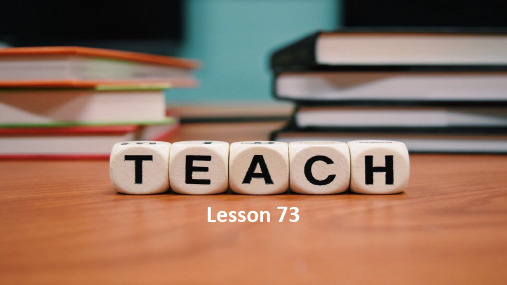
put v. 放….(过去式 put) put......into 放进
take out 拿出 (take 的过去式 took)
5. Then he put his hand into his pocket, and took out a phrasebook.
2. Suddenly, she saw a man near a bus-stop. “ I can ask him the way.” She said to herself.
1.suddenly/ 'sʌdnlɪ / adv. 突然地=All of a sudden 2.see “看” (saw 过去式)see sb. do/doing sth. 3.herself (人称代词宾格her的反身代词) 4.say(said过去式) to oneself 心中暗想
4. The man smiled pleasantly. He did not understand English! He spoke German. He was a tourist.
smile v. 微笑 understand v. 懂,明白,理解 speak / spik / v. 讲,说 【speak +语言】
eg.It's hard to understand this book. 这本书很难懂。 eg.I don’t understand Italian.
understood (understand的过去式) eg.My grandmother understood Russian when she was young. 我的奶奶年轻的时候懂俄语。
新概念英语第一册7月73&74课精品课件!
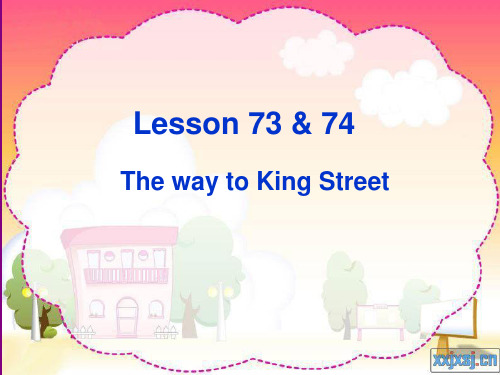
Exercises:
Open your book and look at Part A : try to finish it. Finish the exercises of Part B on Page 152.
1. Recite the dialogue. 2. Finish the related exercise. 3. Learn the new words by heart.
Lesson 74
• 1 hurriedly ad.匆忙地: hurry:adj. 短语: in a hurry:She goes to work in a hurry. • 2 cut v.割,切 过去分词:cut-cut • 3 thirstily ['θə:stili] ad.口渴地 • thirsty:adj. : I am very thirsty. • So I drank the water thirstily. • 4 go [gəu] v.走 : Don't let go. 别放弃! • Let go!放手! • 5 greet [gri:t] v.问候,找招呼 • greet sb.:跟某人打招呼。 • She greet me warmly.
• He , open the book, find a phrase • He, read it, slow • "I, sorry , I, not speak English"
Listen to the tape!
• Listen and repeat!
• 副词的用法: • 作用:副词是通过修身动词或者形容词来进一步强调 该动作或形容词的程度。 • 位置:一般来说,副词放在动词之后形容词之前。 (形前动后) 变换方法: 一,直接在形容词后加ly。 quick:quickly 二,以辅音字母加y结尾的形容词后边y为i加ly: hungry-hungrily。 三,有些词形容词和副词形式一样: late, fast
- 1、下载文档前请自行甄别文档内容的完整性,平台不提供额外的编辑、内容补充、找答案等附加服务。
- 2、"仅部分预览"的文档,不可在线预览部分如存在完整性等问题,可反馈申请退款(可完整预览的文档不适用该条件!)。
- 3、如文档侵犯您的权益,请联系客服反馈,我们会尽快为您处理(人工客服工作时间:9:00-18:30)。
•
buy _b_u__y_s__ _b_o_u_g_h_t_ eat __e_a_ts___ _a_t_e____
•
get __g_et_s___ ___g_o_t __ walk __w_a_l_k_s_ __w_a_l_k_e_d
•
take _t_a_k_e_s__ _t_o_o_k___ dance _d_a_n_c_e_s_ _d_a_n__ce_d_
时态 一般 现在 时
一般 过去 时
用法
一般、 经常、 习惯、 真理
过去某 一时 间做了 某事
动词形 肯定 否定句
式
句
原形/ I do… I don’t 三单 He do…
do/does does… He
doesn’t
do …
过去式 I
I didn’t
did did… do…
He He
did… didn’t
The man smiled pleasantly.
He did not understand English!
do
He spoke German. He was a tourist.
speak
is
Then he put his hand into pocket,
put
and took out a phrasebook.
Lesson 73 The way to King Street
New words and expressions:
• week n.周 • London n.伦敦 • suddenly adv.突然地 • bus stop 公共汽车站 • smile v.微笑 • pleasantly adv.愉快地
(3)形容词与副词形式相同
late----late fast----fast hard----hard well----well
• 写出下列动词的第三人称单数形式、过去式形式
•
go __g_o_e_s__ _w__e_n_t__ enjoy _e_n_j_o_y_s_ _e_n_j_o_y_e_d
take
put… into… 把…放进…中 take…out of… 把…从…中取出 eg.He took out a phrasebook. = He took a phrasebook out of his pocket.
He opened the book and found a
phrase. open
形容词向副词的转换规则
(1)在形容词后面直接加-ly,如: quick----quickly hurried----hurriedly pleasant----pleasantly warm----warmly
(2)以-y结尾的形容词,则把-y改成-i,再加-ly, thirsty----thirstily happy----happily
•
write _w_r_i_te_s__ _w_r_o_t_e__ run _r_u_n__s __ _r_u_n____
•
swim _s_w_i_m__s_ _sw__a_m___ find _fi_n_d_s___ _fo_u_n__d__
•
begin _b_e_g_in__s_ _b_e_g_a_n__ make _m__a_k_e_s __m__a_d_e_
lose
• 1. Last week上周,这个短语奠定了本课是过 去时的基础。 这周 this week,下周 next week
• 2. go to… 去什么地方。go的过去式是went
eg: go to school, go to the museum. 注意:go home, go there(副前不用介) • 3. know sth./sb. very well 对什么东西或什么 人很熟悉。
say
注:直接引用说话者的话叫做直接引语
5. see:看见,强调结果,see sth. look:看,强调动作,look at sth. hear-listen find-look for
6. ask sb. sth. 问某人某事。 eg:He asked the teacher a question.
ቤተ መጻሕፍቲ ባይዱ
•
play _p__la_y_s__ _p__la_y_e_d_ study __st_u_d_i_e_s __st_u_d_i_e_d
Homework
• 背诵课文 • 抄写单词4遍 • 掌握一般过去时 • 完成课后练习及一般过去时练习题
7. say to oneself 心中暗想(不出声地) • talk to oneself 自言自语(小声地) 反身代词:myself, yourself, himself, herself, itself,
ourselves, yourselves, themselves
'Excuse me,' she said.
e.g. The man smiled pleasantly. • 这人友好地笑了笑。 • understand (understood)v.懂,明白
• speak (spoke过去式) v.讲,说 • eg:Speak loudly! 大声说! • hand n.手 扩展---handbag • pocket n.衣袋 • phrasebook n.短语手册,常用语手册 • phrase n.短语 • slowly adv.缓慢地 • eg:The turtle runs slowly.
do…
一般疑问 句及其回 答
特殊疑问 句及其回 答
Do you like What do
milk?
you like?
Yes, I do./ I like No, I don't. milk.
Did you What did
drink milk? you
Yes, I did. drink? No, I didn't. I drank
milk.
Lesson 74 What did they do?
Grammar
1.副词(adverb),本意是补充动词的意义。 它们可以通过修饰动词告诉我们有关句中 某个动作的情况,也就是告诉我们某事是 如何、何时、何地等发生或进行的。
2.副词可以是单个的词(如 slowly) 或词组(如 very well,very much)
• Listen to the tape then answer this question.
• Why did the man need a phrasebook?
Last week Mrs. Mills went to London.
go
She does not know London very well, and she lost her way.
'Can you tell me the way to King Street, please?'
8. Excuse me. 打扰一下,请问…(事前) I’m sorry. 对不起,很抱歉(事后)
9. tell sb. the way to, 告诉某人去……的路。
问路: How can I get to...? Where is ...?
• eg: I know Super Junior very well. I don’t know Korea very well
4. lose one’s way 迷路(丢失了某人的路)。
Suddenly, she saw a man near a bus stop.
see
'I can ask him the way.' she said to herself.
find
He read the phrase slowly. read
'I am sorry,' he said. 'I do not speak
English.'
say
一般过去时
基本结构:主语+动词过去式+其他; 否定形式: ① was/were + not; ② 在动词前加didn‘t,同时还原动词; 一般疑问句: ① Was/Were+主语+其他? ② Did+主语+do+其他? 特殊疑问句: 特殊疑问词+ was/were +主语...? 特殊疑问词+ did +主语+do...?
